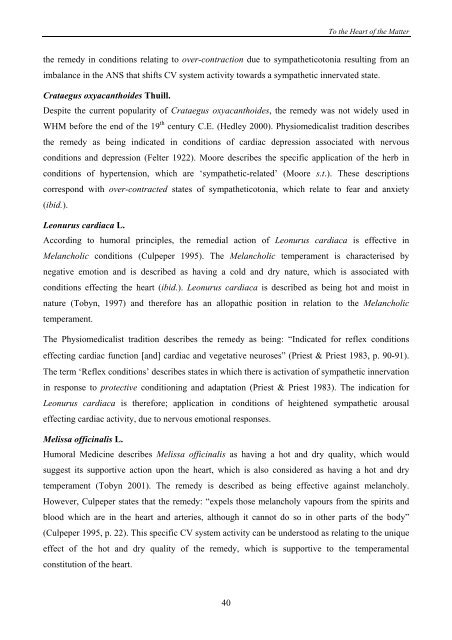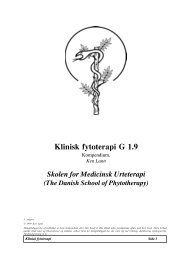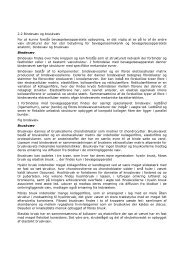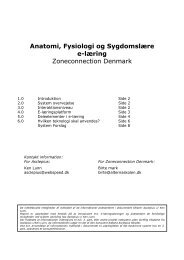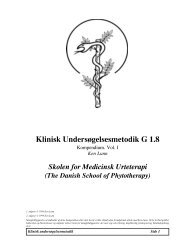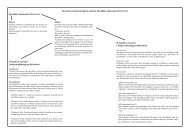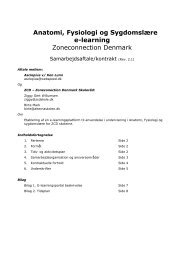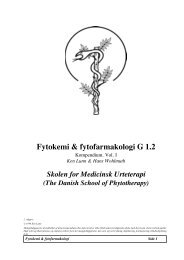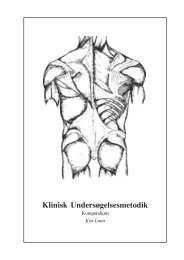PDF File - Asclepius Herbal Consultancy
PDF File - Asclepius Herbal Consultancy
PDF File - Asclepius Herbal Consultancy
You also want an ePaper? Increase the reach of your titles
YUMPU automatically turns print PDFs into web optimized ePapers that Google loves.
To the Heart of the Matter<br />
the remedy in conditions relating to over-contraction due to sympatheticotonia resulting from an<br />
imbalance in the ANS that shifts CV system activity towards a sympathetic innervated state.<br />
Crataegus oxyacanthoides Thuill.<br />
Despite the current popularity of Crataegus oxyacanthoides, the remedy was not widely used in<br />
WHM before the end of the 19 th century C.E. (Hedley 2000). Physiomedicalist tradition describes<br />
the remedy as being indicated in conditions of cardiac depression associated with nervous<br />
conditions and depression (Felter 1922). Moore describes the specific application of the herb in<br />
conditions of hypertension, which are ‘sympathetic-related’ (Moore s.t.). These descriptions<br />
correspond with over-contracted states of sympatheticotonia, which relate to fear and anxiety<br />
(ibid.).<br />
Leonurus cardiaca L.<br />
According to humoral principles, the remedial action of Leonurus cardiaca is effective in<br />
Melancholic conditions (Culpeper 1995). The Melancholic temperament is characterised by<br />
negative emotion and is described as having a cold and dry nature, which is associated with<br />
conditions effecting the heart (ibid.). Leonurus cardiaca is described as being hot and moist in<br />
nature (Tobyn, 1997) and therefore has an allopathic position in relation to the Melancholic<br />
temperament.<br />
The Physiomedicalist tradition describes the remedy as being: “Indicated for reflex conditions<br />
effecting cardiac function [and] cardiac and vegetative neuroses” (Priest & Priest 1983, p. 90-91).<br />
The term ‘Reflex conditions’ describes states in which there is activation of sympathetic innervation<br />
in response to protective conditioning and adaptation (Priest & Priest 1983). The indication for<br />
Leonurus cardiaca is therefore; application in conditions of heightened sympathetic arousal<br />
effecting cardiac activity, due to nervous emotional responses.<br />
Melissa officinalis L.<br />
Humoral Medicine describes Melissa officinalis as having a hot and dry quality, which would<br />
suggest its supportive action upon the heart, which is also considered as having a hot and dry<br />
temperament (Tobyn 2001). The remedy is described as being effective against melancholy.<br />
However, Culpeper states that the remedy: “expels those melancholy vapours from the spirits and<br />
blood which are in the heart and arteries, although it cannot do so in other parts of the body”<br />
(Culpeper 1995, p. 22). This specific CV system activity can be understood as relating to the unique<br />
effect of the hot and dry quality of the remedy, which is supportive to the temperamental<br />
constitution of the heart.<br />
40


